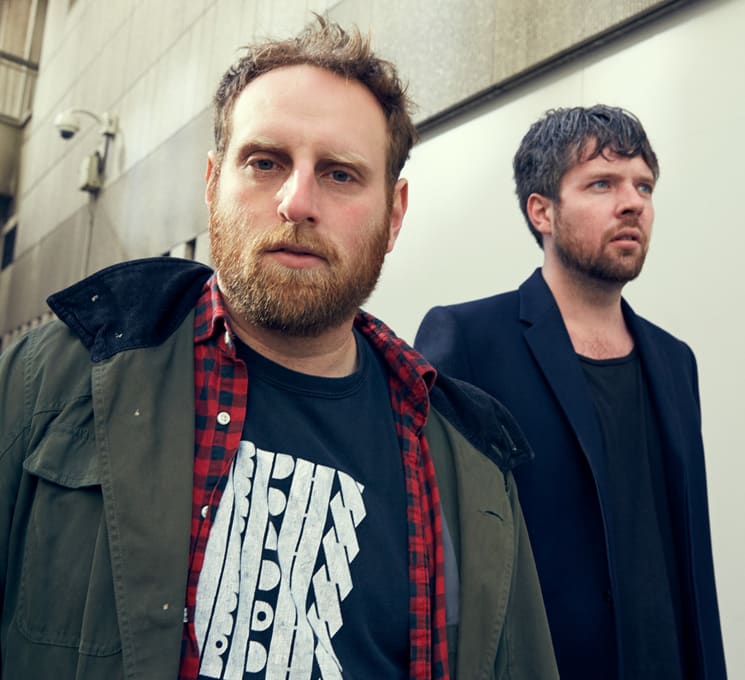For Junior Boys, Big Black Coat represents many things: it's a return to making music as a duo after a five-year layover; it's a self-professed new chapter in their musical careers; but most importantly, it's a love letter to the genre of music they grew up idolizing.
After releasing four albums in seven years, vocalist, multi-instrumentalist and songwriter Jeremy Greenspan views Junior Boys' first era as "a complete scenario of the band," which partly explains their four-and-a-half-year hiatus.
Greenspan explains that Junior Boys' musical sabbatical allowed the duo (alongside producer Matt Didemus) to re-examine their craft — including ditching the songs they had written for their next album. "The songs we had, they didn't have much life in them, in part because I didn't feel that invigorated to do anything. It was only through working with Jessy Lanza [on her 2013 debut Pull My Hair Back] and doing stuff for myself [that] gave me a sort of new lease on life that made me want to do more Junior Boys stuff. Because I had other things going on that were doing well, I didn't put all my eggs in one Junior Boys basket, so it made me feel like I could be more adventurous with it."
After their creative purge, Junior Boys decided to return to their roots, drawing influence from the electronic music scene that emerged from their Hamilton hometown in the 1990s, "It's funny that Hamilton had more of a scene for electronic music 20 years ago, in a way, than it does now," says Greenspan about his teenage years. "There was a record label called Steel City Records that put out techno tracks that was aligned with Plus8 Records in Windsor, with John Acquaviva and Richie Hawtin, so all of those people would come and play in Hamilton, the people who were young and into it became the people from the Hamilton dance scene, like ourselves and Caribou, Azari & III and Orphx."
The resulting 11 tracks that make up Big Black Coat stand as some of Junior Boys' sleekest, sharpest and least complicated to date, as the duo allow icy rhythms and pulsating beats to drive each track. Greenspan's vocals come off drier and more repetitive, playing off like old-school techno samples at times.
"I was doing a lot of that, recording a lot of the vocals in real time," he explains. "Everyone's got this idea that the only way to record vocals is in a really perfect room with a super high-end microphone. So this time, it was the complete opposite — vocal take, recorded with the speakers going. I wasn't even using headphones, just that kind of craziness. I wanted the vocals and the lyrics to reflect that feeling of the music. The less you say, the more that can be unpacked."
After releasing four albums in seven years, vocalist, multi-instrumentalist and songwriter Jeremy Greenspan views Junior Boys' first era as "a complete scenario of the band," which partly explains their four-and-a-half-year hiatus.
Greenspan explains that Junior Boys' musical sabbatical allowed the duo (alongside producer Matt Didemus) to re-examine their craft — including ditching the songs they had written for their next album. "The songs we had, they didn't have much life in them, in part because I didn't feel that invigorated to do anything. It was only through working with Jessy Lanza [on her 2013 debut Pull My Hair Back] and doing stuff for myself [that] gave me a sort of new lease on life that made me want to do more Junior Boys stuff. Because I had other things going on that were doing well, I didn't put all my eggs in one Junior Boys basket, so it made me feel like I could be more adventurous with it."
After their creative purge, Junior Boys decided to return to their roots, drawing influence from the electronic music scene that emerged from their Hamilton hometown in the 1990s, "It's funny that Hamilton had more of a scene for electronic music 20 years ago, in a way, than it does now," says Greenspan about his teenage years. "There was a record label called Steel City Records that put out techno tracks that was aligned with Plus8 Records in Windsor, with John Acquaviva and Richie Hawtin, so all of those people would come and play in Hamilton, the people who were young and into it became the people from the Hamilton dance scene, like ourselves and Caribou, Azari & III and Orphx."
The resulting 11 tracks that make up Big Black Coat stand as some of Junior Boys' sleekest, sharpest and least complicated to date, as the duo allow icy rhythms and pulsating beats to drive each track. Greenspan's vocals come off drier and more repetitive, playing off like old-school techno samples at times.
"I was doing a lot of that, recording a lot of the vocals in real time," he explains. "Everyone's got this idea that the only way to record vocals is in a really perfect room with a super high-end microphone. So this time, it was the complete opposite — vocal take, recorded with the speakers going. I wasn't even using headphones, just that kind of craziness. I wanted the vocals and the lyrics to reflect that feeling of the music. The less you say, the more that can be unpacked."
